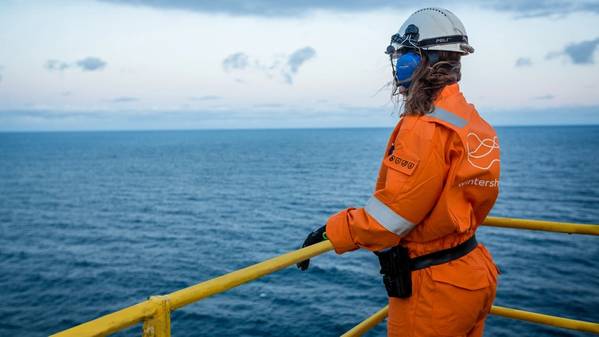
German oil and gas company Wintershall Dea has set greenhouse gas reduction targets for its production activities (scope 1 + 2 emissions, operated and non-operated upstream activities at equity share basis).
The company said Monday it wanted to achieve net zero operations by 2030. In 2019, the company’s operating activities generated around 2.5 million metric tons of CO2 equivalents worldwide.
“For E&P companies it can’t just be business as usual,” says Mario Mehren: “The future of energy is low-carbon.”
Wintershall Dea said it supported the European Union’s goal of achieving carbon neutrality by 2050.
“We’re realistic. The amounts of CO2 released in our activities are small compared with the CO2 emissions produced by the combustion of oil and gas. But [reducing] emissions that arise directly from our operations to net zero is a contribution that we can and want to make ourselves,” says CEO Mario Mehren.
"All upstream activities will be net-zero by 2030 already. This means that all emissions resulting from the production of natural gas and crude oil (Scope 1), as well as the emissions resulting from energy consumption required for production (Scope 2), will be reduced as much as economically and technically possible. Emissions that cannot be reduced further shall be offset through investments in nature-based solutions," Wintershall Dea said.
“And this applies both to our own operated production facilities and proportionately to the production projects not operated by us in joint ventures worldwide,” says Mehren.
Four pillar approach
Wintershall Dea said it aimed to achieve net-zero operations by 2030 with "a four-pillar approach" by increasingly focusing on natural gas and crude oil reservoirs that can be produced relatively CO2-efficiently.
At the same time, Wintershall Dea said, strict emissions management (e.g. increasing energy efficiency) shall be pursued further.
"With these two measures alone, Wintershall Dea aims to reduce its own CO2 emissions by more than 50 percent," the company said.
Those measures would be complemented by investments in nature-based mitigation solutions (like forest protection and reforestation) and the development and use of new mitigation technologies.
"These include participation in carbon capture storage projects (CCS) in the North Sea and investments in hydrogen projects. During the next ten years, the company intends to invest around €400 million in reducing and offsetting greenhouse gas emissions," the company said.
"Natural gas – but also oil – will continue to play important roles as energy sources and raw materials for chemical production. Natural gas makes the energy transition possible: It is abundant, affordable, lower-carbon and flexible in its use, and it produces significantly fewer emissions than coal in generating electricity and heat. At the same time, it can be used to produce hydrogen in the coming years and decades to come. Oil will also play its role. However, it should not be burned as a fuel, but used as a raw material for many products such as medicines, new technologies and everyday products," the company said.
“We will successfully adapt to the energy transition. Because change has always been part of our corporate DNA. From potash and salt, we moved into oil. Today, our focus is clearly on natural gas. There are now exciting new prospects with solutions such as CCS and hydrogen,” the Wintershall Dea CEO explains.
Methane intensity
In addition to targeting net zero operations by 2030, Wintershall Dea will reduce its corporate methane intensity to 0.1% by 2025. Beyond 2030, the intention is to significantly reduce so-called Scope 3 emissions as well, which are mainly generated through the combustion of gas and oil produced by Wintershall Dea.
“We have identified the technological areas where our assets and competencies can help in contributing to emission reductions. These include in particular CCS and hydrogen. For example, besides a methane pyrolysis research partnership with the Karlsruhe Institute of Technology, we have access to several depleted fields in the Southern North Sea, and to significant pipeline infrastructure in Europe that can be used for CCS and hydrogen transportation respectively”, Mehren says.